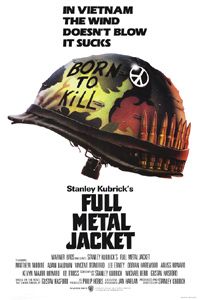 Full
Metal Jacket is Stanley Kubrick's (A
Clockwork Orange, 2001: A Space Odyssey) film
version of former Marine Gustav Hasford's semi-autobiographical novel, "The
Short-Timers" (1979). Hasford also contributed to the screenplay, although the
film version is told in two "chapters" instead of the book's three (The
boot camp depiction is faithful to its source; the war reporter and Vietnam
battle sequences are condensed and combined for narrative brevity.)
Full
Metal Jacket is Stanley Kubrick's (A
Clockwork Orange, 2001: A Space Odyssey) film
version of former Marine Gustav Hasford's semi-autobiographical novel, "The
Short-Timers" (1979). Hasford also contributed to the screenplay, although the
film version is told in two "chapters" instead of the book's three (The
boot camp depiction is faithful to its source; the war reporter and Vietnam
battle sequences are condensed and combined for narrative brevity.)
While the details of the war and how they play out belong to Hasford, the
thematic material is pure Kubrick, touching on many aspects regarding the
philosophical conflicts of war, especially in the ambiguous stance of "peace
keeping" missions that involve evisceration of whole towns and the peoples who
reside there. It's no coincidence that the main protagonist, Pvt. Joker (Modine,
Private School), as he
has been dubbed by the drill sergeant, doesn't quite know the reasons why he
has contradictory uniform adornments like "Born to Kill" on his helmet, while
the peace symbol button is proudly displayed on his jacket. Marines aren't
trained to keep the peace, they are told to be killing machines, showing no
mercy for Charlie, or of even the people they are trying to protect. Not that
they've been taught to care to tell the difference anyway.
The film's first half deals with the boot camp experience, where Gunnery
Sergeant Hartman (Ermey, Scenes of the Crime) has to take a sad sack unit and turn them into killers,
emotionally
hardened and physically ready for battle. The methods employed by Hartman are cruel,
demeaning, and brutal, especially for those who can't cut it, like Leonard
Lawrence (D'Onofrio, Men in Black), who is labeled with the not-too-flattering nickname of "Gomer Pyle".
Hartman rides Pyle as hard as he can, bending his will in order to strengthen
him, or break him altogether. Things get testy when Pyle's deficiencies and
errors cost the rest of the unit punishments, and he becomes the unit's
biggest liability. Pyle has been shattered, they just don't know it yet.
Once the boot camp experience is over, we follow now-Sergeant Joker's exploits
as a correspondent for the military publication "Stars & Stripes" in Vietnam.
Though it is a more cushy assignment than infantry, the tasks prove to be very
perilous, as they must travel along with the men while on dangerous missions,
while also fighting along with them, especially vulnerable to ambush. The main
conflict involved in this half of the film occurs when the men are lost and
unable to get assistance, while a sniper lures them out in order to kill them.
Full Metal Jacket has grown in stature to become a classic war film for
many viewers, and is
seen by some as another of Kubrick's masterworks. That said, it has its shares
of strengths and weaknesses, mostly because it is more interesting primarily as a
collection of little bits than it is as a unified, cohesive whole. However,
the stronger elements are so potent, it's the kind of film that stays with you
long after the run time expires. The boot camp sequence proves to be more
eerie and memorable than the later scenes in Vietnam, though those have their
merit, especially in commentary of the ironies of the war itself. When the
film ends with the soldiers singing the theme of the "Mickey Mouse Club", you
can read into Kubrick's thoughts as to how he considered the nature of the
entire operation itself, and of the disconnection the mostly teenage soldiers
feel to any of the death and destruction literally at their feet.
Though Modine is the star, and a young Vincent D'Onofrio would also play a
memorable role as Pyle, the real standout performance comes from R. Lee Ermey
as the drill instructor. Ermey, a former Marine drill instructor himself,
improvised a great deal of his lines with perfection -- tough, menacing,
unforgiving, but somehow fair in his unfairness -- he treats everyone like
garbage.
Full Metal Jacket is a potent Vietnam film, and some who've seen it think it
the best of the bunch. I personally won't go that far. It makes me think more
than it makes me feel, although I think Kubrick intended for both -- the most
fascinating subtexts are told from an emotional distance. Sure, it's fierce,
intense, and riveting, but in an eerie, detached fashion. Like the scene where
Pyle is pelted with bars of soap wrapped in towels by his fellow men in his
unit, he feels the pain, but the outrage, the anger, the viciousness of their
actions is muted by the impersonal nature of it -- Kubrick's piece is equally
painful but impersonal.
My take is that it is an encapsulation of many great small moments that gel
into a unnerving, but still enriching experience, even if the film, as a
unified entity, doesn't strike as hard as the sporadic character bits and
momentary cynical commentaries. Here is but one: turning good men into monsters may be
deemed necessary for success on the battlefield, but it often comes at a cost.
It's hard to find compassion for others when it's been completely stomped out of you. In
one of the film's many ironies, the humaneness of the mercy killing of a
mortally wounded girl is the only act that Joker's fellow Marines consider too
hardcore. A John Wayne movie, this is not.
Qwipster's rating:





©2007 Vince Leo

